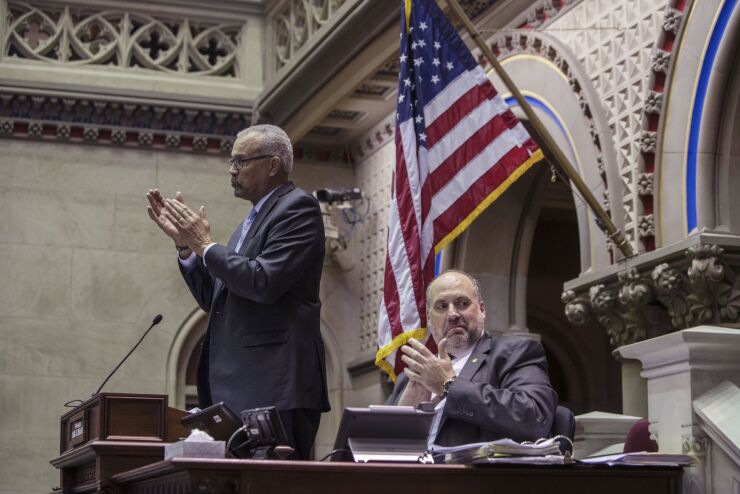New York State lawmakers may raise taxes to combat a
Assembly Speaker Carl Heastie, D-Bronx, told reporters last week that higher taxes would be considered in response to an estimated budget gap that is tied largely to rising Medicaid expenses. A

"Unless money is going to fall from the sky, you're always going to have to try to do things," said Heastie, who did not provide specifics for possible tax hikes the legislature may take up when returning to Albany in January. “The two options always are do you cut spending or do you raise revenue and for us in the Assembly we always believe in raising revenue.”
The New York State Division of Budget is developing a 2020 savings plan to try and avoid piercing the Medicaid Global Cap that may involve across-the-board reductions in rates paid to providers and health plans. The state is forecasting that the budget gaps will worsen to $8.5 billion in the 2023 fiscal year.
Senate Majority Leader Andrea Stewart-Cousins, D-Yonkers, is not committing to looking at higher taxes or fees. Democrats seized control of the state Senate from Republicans last year giving the party a hold on the full legislature and governor’s office.
"Democrats finally delivered the permanent property tax cut and the lowest middle class tax rate in generations,” Stewart-Cousins spokesman Mike Murphy said. “The Senate Majority continues to be committed to alleviating the tax burden on middle and working class New Yorkers."
A Dec. 4 Moody’s Investors Service report noted that New York State’s Medicaid spending is growing faster than the nation while outstripping its targeted growth rate. Moody’s analyst Marcia Van Wagner said the projected recurring budget shortfalls is a credit negative for the Empire State with more than 11% of New York’s general fund receipts expected to be consumed by Medicaid costs in the next few years.
“For the current fiscal year, the state needs to take nearly $1.8 billion in budget-balancing actions, even after accounting for a $2.2 billion Medicaid spending deferral into next year,” Van Wagner wrote. “The state's ability to return to a sustainable and structurally balanced budget will significantly hinge on rekindling its previous commitment to control Medicaid costs.”
Moody’s rates New York State general obligation bonds Aa1 with a stable outlook. The Empire State’s GO debt is rated AA-plus by S&P Global Ratings, Fitch Ratings and Kroll Bond Rating Agency.
Van Wagner noted that increased Medicaid costs are partly attributable to New York’s recent minimum wage increase since healthcare providers are eligible for higher reimbursements as their labor costs rise. The phased-in minimum wage hike to $15 an hour cost the state $703 million in the 2019 fiscal year with projections for $1.5 billion of expenses in 2020 and 2.3 billion by 2023, according to Van Wagner.
New York’s current budget challenges were also driven by long-term Medicaid enrollment increasing 12% in 2019, more than twice the expected rate of growth, according to state’s Department of Health. A phase out of enhanced federal funding supporting Medicaid expansion and payments to distressed hospitals have also been contributors to rising costs, according to state officials.
The Senate and Assembly return to session on Jan. 8 with Cuomo slated to unveil his 2021 fiscal year executive budget soon after. Lawmakers have until March 31 to agree on a new budget before the 2021 fiscal year begins April 1.
"Opinions are relevant when they are based on facts, and we will present actual numbers and options when we do the budget, as otherwise, this is all just speculation,” Cuomo’s senior advisor Richard Azzopardi said in a statement.





